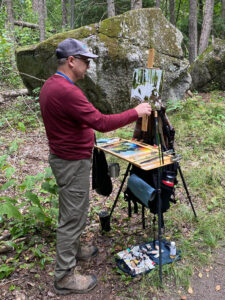Next slate of prison closures could be announced soon
Gov. Kathy Hochul has the power to close up to five more state prisons this year, and the decision on which facilities will be shuttered is expected to come soon, according to some state lawmakers.
During a press conference on public safety Thursday, Hochul answered a reporter’s question about what conversations her administration has been having on what facilities to close, and when to announce those closures. Under the terms of this year’s state budget, the prisons will close 90 days after the public notice of closure is released.
Hochul said the closures are coming because many state facilities no longer host enough incarcerated people to warrant continued operation. The peak of the state’s prison population was 72,000 in 1999, but the count is now around 32,000 incarcerated people.
“That goes to the fact that many behaviors are no longer criminalized, such as drug use, cannabis for example,” she said. “So that’s a good outcome to maintain. The same prison system that was in place for those higher numbers is not logical.”
Hochul said she’s also weighing the needs of the employees in those prisons — correctional officers, administrative staff and medical providers.
“Every one of them gets the right of first refusal at another facility, and we have other facilities that have shortages of workers,” she said. “I know, geographically that becomes a challenge, but there actually is a very heavy concentration of prisons in Finger Lakes, in the north country area.”
As New York’s leadership continues efforts to right-size the state’s prison space in response to a continued drop in inmate headcounts, 25 state facilities have closed since 2009. Many of those have been in upstate New York, including the Watertown Correctional Facility that closed in 2021, the Ogdensburg Correctional Facility that closed in 2022, Camp Gabriels in Franklin County, which was the first of the recent wave of closures in 2009, and Chateaugay Correctional Facility also in Franklin County, closed in 2014.
As for the facilities to be closed this year, Assemblyman Scott A. Gray, R-Watertown, said he’s hearing that the decisions will be announced soon, and he said he had anticipated the decision would be announced only after the end of the legislative session.
“Any time, the minute we left Albany it could drop,” he said. “It wasn’t a surprise that they waited for us to leave Albany.”
He said he anticipates the announcement will be made on a Friday — following a common pattern for state officials to release potentially controversial information just ahead of the weekend.
He said he has no clear view on how many facilities may be closed.
Gray said he has some suspicions that the state is looking to close facilities that are geographically close to others, because of Hochul and other Democratic leaders’ repeated references to the importance of finding jobs for the staff of the facilities to close.
Gray said he has been an advocate on the issue of keeping the prisons in his north country district open. The 116th District, covering western Jefferson County along the St. Lawrence River shore up to Potsdam and Massena in St. Lawrence County, contains two active state prisons — Cape Vincent Correctional in Jefferson County and Riverview Correctional in St. Lawrence County. Many of his constituents are also staff at nearby Gouverneur Correctional Facility just outside his district.
He said he focused on two issues when speaking with Department of Corrections and Community Supervision officials, both related to the staffing mix of the prisons in the north country. North country prisons train more correctional officers than they can staff, so they serve as feeders for the wider state prison system. They also have generally strong medical staffing, as opposed to other prisons in the state that have understaffed medical departments.
“The COs here take a true interest in the job that they do, the rehabilitative work that they do, and the programming would support that,” Gray said. “Our educational programs that we have in our facilities are really well run, and staffed well.”
Gray added that the job market in the North Country is heavily reliant on the prisons, which are often among the largest employers in the communities that host these facilities. Some advocates for prison reform have pushed back on that argument, saying its immoral and wrong-headed to keep incarcerated people in a prison solely for the benefit of the community that hosts that prison.
Gray said he understands those concerns, but at the same time says that the economic impact of closure can’t just be ignored.
“The jobs, the indirect jobs and the agreements they have for local municipalities, water, sewer, you’re going to create a substantial gap in the midst of all these costs that are right now partially picked up by those prisons because of the usage,” he said.
–
Redevelopment
–
On Thursday, Hochul also spoke about her goals for the redevelopment of the prison facilities that have been closed.
Her administration has made pledges to focus heavily on redevelopment, as a bridge to close the economic hole left by the departure of the prison, but advances have not progressed as quickly as some anticipated.
Hochul said she has asked her staff to come up with recommendations for reuse for all previously closed prisons, but some facilities pose greater challenges to reuse than others. A handful of state prisons were opened, or remain open, within the bounds of the Adirondack Park, which is protected land by constitutional statute. Camp Gabriels in Franklin County is one such facility, and efforts to redevelop the former tuberculosis hospital turned minimum-security prison have been stymied for over a decade now by that constitutional protection.
“It takes a constitutional amendment to pass the legislature twice, put it to the voters in a referendum, in order to have another use for that property,” Hochul said.
Assemblyman D. Billy Jones, D-Chateaugay Lake, said redevelopment is a major concern of his in his North Country district covering Franklin, Clinton and northwestern Essex County. The two closed prisons in his district have not seen redevelopment in the more-than-decade that they’ve been closed, and he said he is very interested in seeing some sort of constitutional amendment made to allow Camp Gabriels and the other closed facilities in the Adirondack Park.
As for the other upstate prisons that are not restricted for reuse by the Adirondack Park, Hochul said she has engaged with local leaders including town supervisors, including the Watertown town supervisor, and many have talked about wanting to see some sort of housing-focused redevelopment plan.
“They have so many jobs that are unfilled, in hospitality, hotels, the restaurants,” Hochul said. “We’re trying to attract more people to go to the north country, but people have to drive an hour and a half to get to their job, it’s not working.”
Jones said he would like to see the legislature and governor work together to restore a Cuomo-era policy that provided $50 million statewide for communities close to closed prisons, as well as tax credits.
“I would like to see that fun stand back up so we can do something to replace what’s lost,” he said.
Jones said he would like to see housing policy focus on some of the problems in the North Country, but he said any plan should include housing stock for middle-income people and infill in communities that have lost housing over the years.
“The number one thing when trying to recruit people to the area is trying to find housing, whether that be for nurses, school teachers, employees and businesses,” he said. “We need housing stock, we need housing affordability, but we also need the resources and wherewithal to get some of these older places, such as prisons, we need the ability to get resources to help with that development.”
Gray said he also isn’t convinced that housing is the right path forward for some of these closed prisons — especially the majority that have been completely “cold closed” for years now.
Local leaders, residents and lawmakers in Ogdensburg successfully advocated for DOCCS officials to keep minimal heat and electricity running to the closed Ogdensburg prison when it closed in 2022, keeping it in a better condition than the other closed prisons that had all services terminated and have been left to the freeze-thaw cycle for years now.
“Watertown is completely closed down,” Gray said. “The longer those buildings get there, the harder to redevelop them into anything useful.”
Gray said there are three tiers of abandoned state facilities in and around St. Lawrence County, and they’ve created a strong sense of concern among residents in his district about the future of other state-owned property.
There’s SUNY Potsdam, which is going through a downsizing and pulling operations out of a handful of campus buildings, then there are the prisons in Watertown and Ogdensburg, both of which have been empty for a handful of years — one still maintained and the other left to nature.
Then, at the extreme end are the abandoned buildings on the St. Lawrence Psychiatric Center campus in Ogdensburg, some of which have been empty and decaying for over 40 years. Demolition on the most decayed buildings on that campus started earlier this year.
Gray said he has little confidence in the future of the empty prisons in his district, and is worried that the state may make more of them empty.
“The prisons are the psych center 2.0,” he said. “They’re heading down that direction and it’s going to take a massive amount of money and effort to get them taken down.”
Jones said he has the same concerns that the cold weather of the North Country can cause extensive damage relatively quickly on unmaintained properties. He has a bill in the legislature, which has not yet passed, that would require the state to put together a redevelopment plan and continue maintenance on any facilities they close.
“It’s something near and dear to my heart, I have seen the consequences of not taking care of or maintaining these properties,” he said.
Gray said he’s not convinced the closed prisons are a great place to build housing even if they are properly redeveloped. He acknowledged that housing is a problem in his district, but much of the problem lies in the decay of existing housing stock in cities, villages and population centers in the region.
“We cannot turn out backs on municipalities,” he said. “We have to look at housing quality in the municipalities, and either rehab or build in our housing there. We cannot turn our backs on the cities of Watertown or Ogdensburg.”



